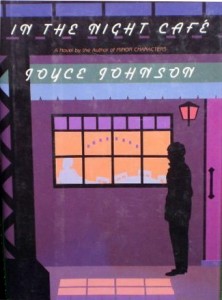From In The Night Café
I woke up with you the next morning, and I thought, Found. I remember it, Found—
as if a string had been plucked in the midst of great silence. I heard the note, then
the overtones washed over us, not dying but continuing out there in space. I’ve never
heard it that way again with anyone, though God knows I’ve listened for it. The sun
was in the window and there was an odd, white film over everything, a fine dust, you
could see our footprints in it. I lay there astonished with your arms around me.
And later we were having breakfast at the kitchen table. I’d somehow made eggs and
we were drinking coffee as if we’d been together a million ordinary mornings. Out of
the blue you said, “Look, I can’t marry you yet. But I’m going to marry you.”
That seemed so wildly extravagant that I trusted it. I’d never met anyone so rashly serious, although in the circles I moved in speed was of the essence, an entire way of being. Men and women came together so quickly they could be said to have collided the way colors collided on canvases, running into each other, merging. Lucky and unlucky convergences.
“In the Night Café is heartbreaking and exhilarating at once. Joyce Johnson has written a memorable love story.”
–Hilma Wolitzer
“A splendid piece of work, and I read it with great pleasure. The voice of the narrator is so authentic, and
her story is told with admirable integrity, restraint, and poignancy.”
–-Lynne Sharon Schwartz
“The book sails on its first-person narrator: a fiercely believable, testifying voice that is pungent, close to the
bone, stinging with candor. Lyrical atmospheric details aside, the poetry of this novel is in its quick psychological
insights and the ability to make us shudder and feel along with it….The novel’s penultimate section, “The Children’s
Wing,” …is Joyce Johnson’s finest achievement as a writer and one would have to search hard to find as powerful a
thirty pages in recent American fiction.”
–-Philip Lopate, New York Times Book Review
“Almost heartbreakingly evocative, uncommon deftness and restraint….Johnson has a way of characterizing people
with a single stroke, allowing us to color in the rest.”
–Ann Tyler, Chicago Tribune

